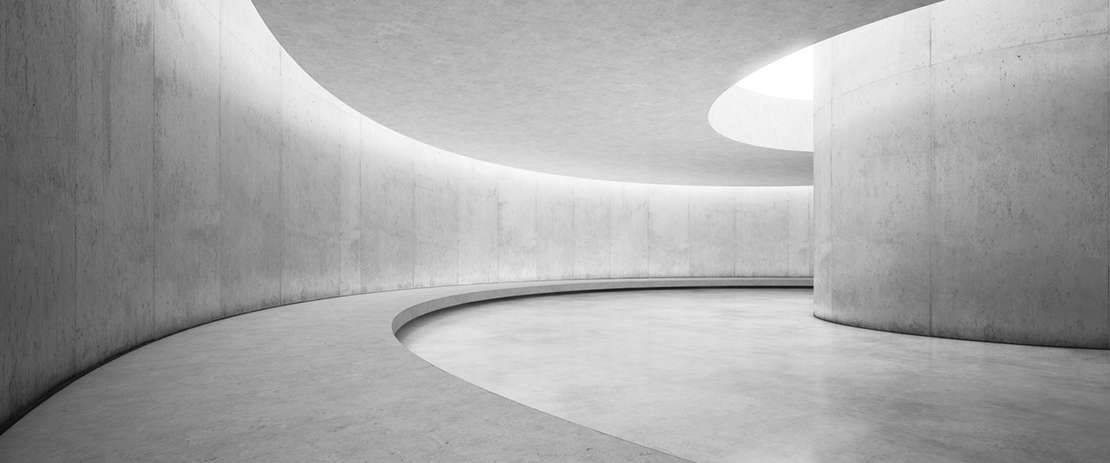Low environmental footprint in concrete production with a 20% reduction in carbon dioxidee emissions with the use of EvoCrete® CC.
EvoCrete® CC is a hardening accelerator according to DIN EN 934-2: 2012-08. In addition to the acceleration of the hydration process, further positive properties appear, which make the application of EvoCrete® CC extremely attractive in the production of concrete, both technically and economically.
Concrete mixing calculation
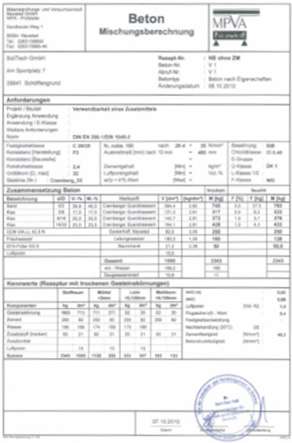
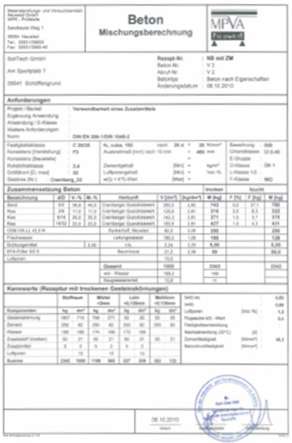
When using EvoCrete® CC, the cement content in the concrete can be reduced by approx. 20%, with constant or 8 to 10% higher ultimate compressive strength of the hardened concrete. Due to an extreme increase in bending tensile strength at the early stage of the hydration process, the crack formation in the concrete is significantly reduced to eliminated.
This effect allows the installation of large-format concrete paving slabs from 10 m to 20 m, without reinforcement and a 50% reduction of expansion joints. The reduction of the expansion joints is accompanied by an increase in travel comfort and a reduction in the maintenance effort for leaky expansion joints.
| Different test parameter | Sample 1 without EvoCrete® admixture |
Sample 2 2% EvoCrete® admixture |
Sample 3 4% EvoCrete® admixture |
| Slump in mm (acco. to DIN EN 12 350-5) |
187 mm | 184 mm | 188 mm |
| Air content in % (acco. to DIN EN 12 350-7) |
4,5 Vol. - % | 4,8 Vol. - % | 5,2 Vol. - % |
| Fresh concrete bulk density (acco. to DIN EN 12 350-6) |
2.210 kg / cm² | 2.200 kg / cm² | 2.190 kg / cm² |
Compressive strength
EvoCrete® in combination with all these factors means higher durability, safety and more travelling comfort while reducing maintenance and costs.
Air-entraining concrete
When EvoCrete® CC is used in combination with air entrainers during concrete production, the radius of the air pores is reduced by 11% at 2% EvoCrete® CC content and 22% at 4% EvoCrete® CC content.
However, the total volume of the air pores is the same for untreated concrete offset with EvoCrete® CC, which means that the number of air pores has increased with a reduced radius. An increased number of air pores means a more homogenous distribution in the concrete and an increased frost-thaw resistance and a higher de-icing salt resistance of the concrete.
Pressure porosimetry
- EvoCrete® in combination with an air-entraining agent reduces the radius of air pores. The reduction of the radius is proportional to the applied amount of EvoCrete®.
- 2% EvoCrete®: reduction of the radius 11 %
4% EvoCrete®: reduction of the radius 22 % - The total volume of all air pores in the concrete is constant, but the amount of air pores in the concrete increases.
- • A higher amount of air pores in the concrete improves resistance against the destructive influence of frost-thaw-changes and increase de-icing resistance.
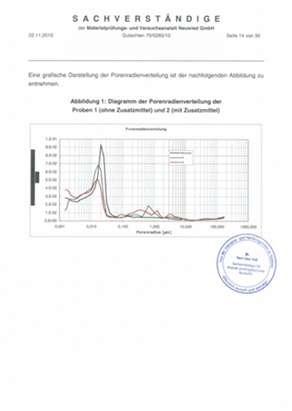
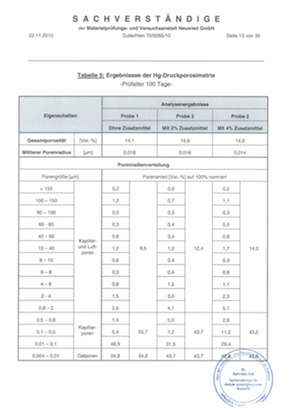
Determination of the corrosion behaviour
The corrosion behaviour was tested at the Institute of Building Materials Research in Aachen (ibac). The results shown below were determined during these tests:
- Current density after 1 hour: 0.33 μA/cm²
- Current density after 24 hours: 0.08 μA/cm²

